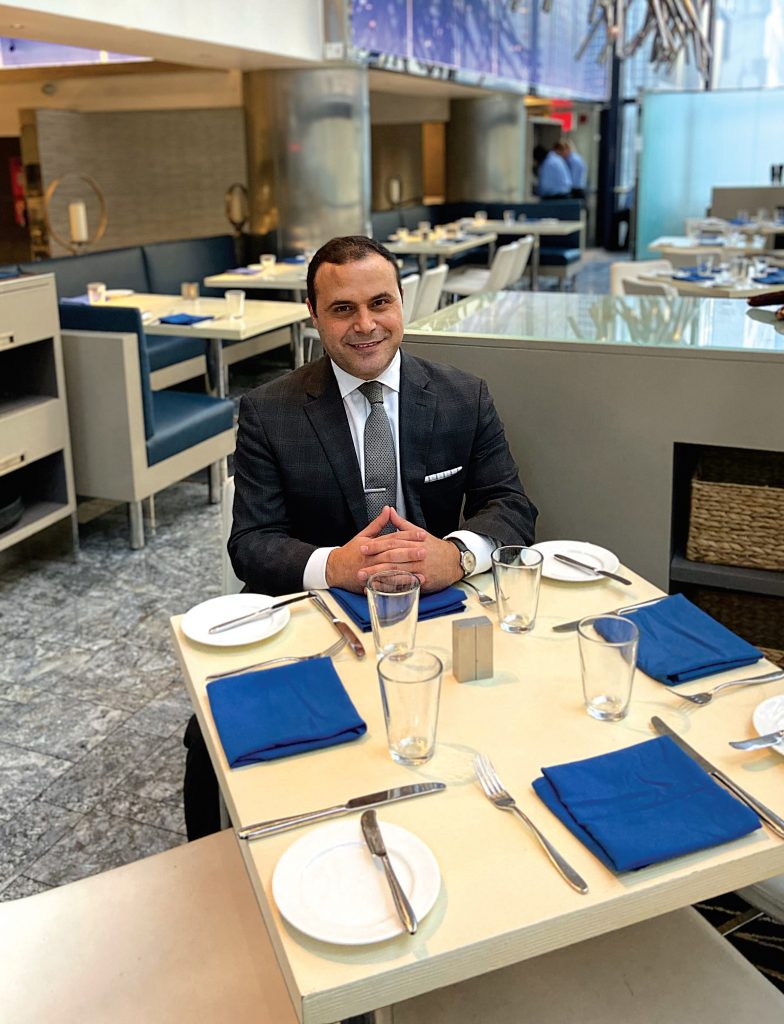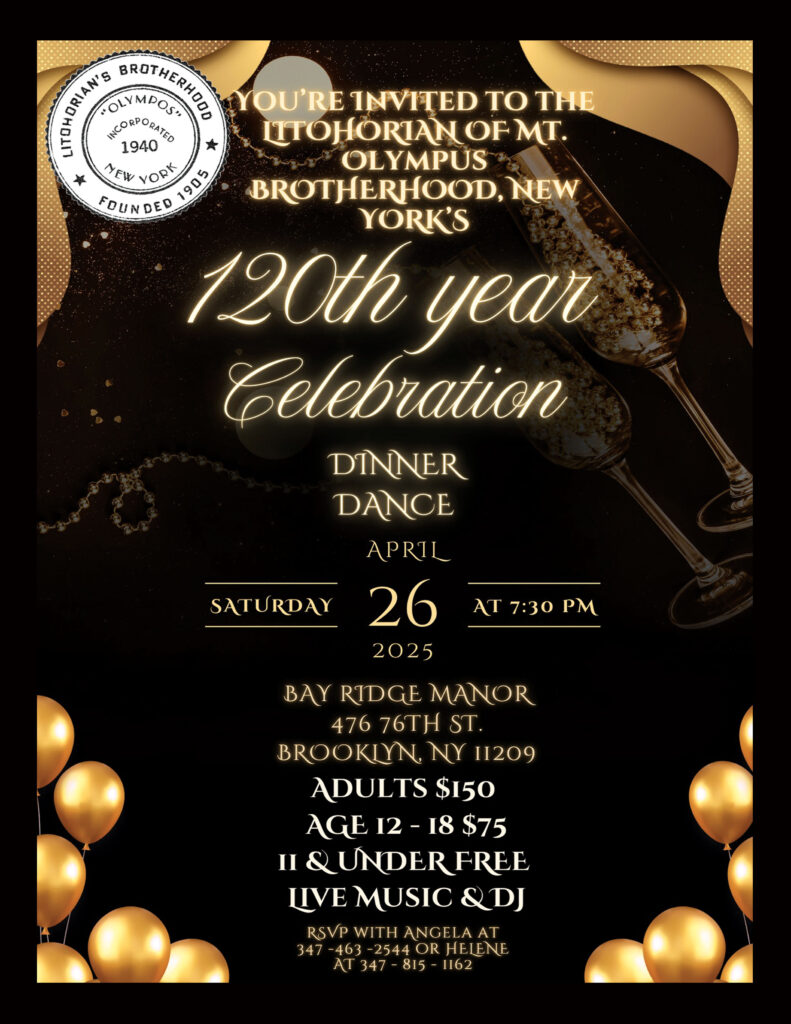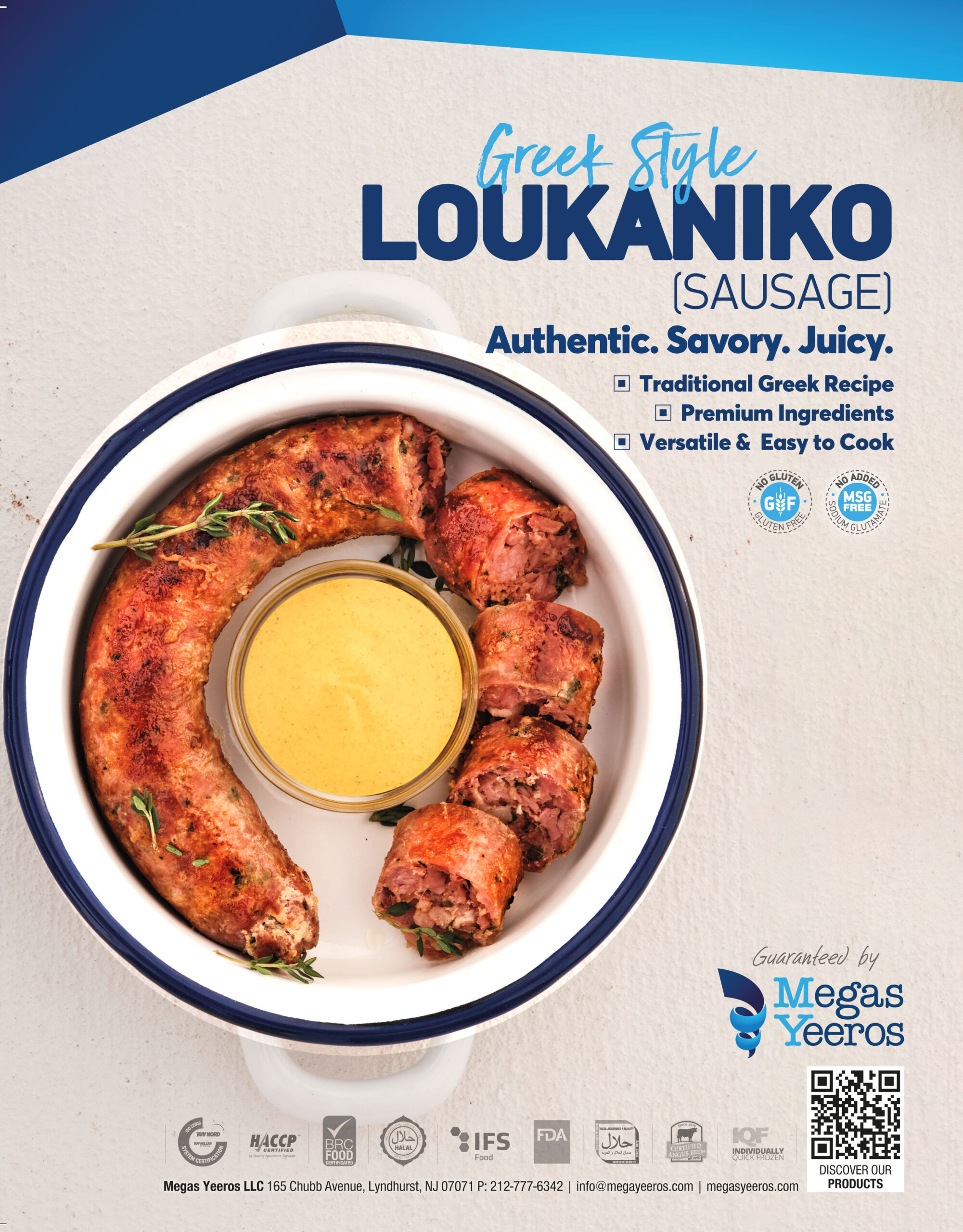Two for Lunch with Dimitrios Mantzouranis
Posted by estiator at 18 January, at 09 : 19 AM Print
It’s very much like the Greek way of life. Having a higher purpose—the ‘why’ of what drives you—is key to living a happier life and being engaged at work.

Two for Lunch with Dimitrios Mantzouranis
A conversation with the New York Grand Hyatt’s assistant food and beverage director.
BY MARIA BENARDIS
Dimitrios Mantzouranis is my afternoon lunch date. Mantzouranis, who just turned 40, has an infectious smile and a mild Greek accent that gives an air of European sophistication. He dresses impeccably to match. Mantzouranis holds the heady title of assistant food and beverage director for New York City’s Grand Hyatt Hotel, and we are meeting at the hotel’s restaurant. In keeping with traditional Greek hospitality, a delicious and colorful spread was laid out, with the chef showcasing some of his menu offerings, along with two special treats conceived at the prospect of sitting down with another Greek: a salad of watermelon, feta, and olives, as well as a salad of golden beets, citrus, and macadamia nuts. The other dish we shared was one celebrating the chef’s heritage: pierogi with a cream potato sauce and crispy onions. The meal was a gastronomical experience that left me full but still wanting more. The dishes were beautifully prepared and well presented with interesting flavor profiles. This was a meal I can compare to ambrosia, the food of the gods.
Although work can be consuming, Mantzouranis begins our chat with a boast about his family: He and his wife, Trish, have 2½-yearold twins, Evan and Angie. Trish was the executive director of a nonprofit organization. They met at an event she was hosting at the Hyatt Regency in Jersey City when Dimitrios worked there. She is now a full-time mom. Raised in Athens, Mantzouranis left his home 13 years ago (as many Greeks of his generation did when the economic crisis struck) to pursue greener pastures. He had been working in the country’s hospitality sector from the age of 18, earning his marks in various food-and-beverage-related roles on the tourist islands of Rhodes, Kefalonia, and Ios, the last of which is renowned for the revelry of its visitors. His formal education comes by way of a bachelor’s degree in tourism management from the Technological Institute of Athens and a master’s in international hospitality management from the Swiss Hotel Management School in Leysin, Switzerland.
After speaking with colleagues and mentors, he homed in on the Hyatt group as his employer of choice because of the company’s reputation for training and investing in people that demonstrate potential. In his 13 years with the company, he has had positions of increasing responsibility that have taken him to locations that include Philadelphia, Los Angeles, New Jersey, and San Francisco. For the last eight of those years, he has made the Grand Hyatt in New York City his home, rising to his current position.
“The Hyatt has an operating philosophy of delivering on excellence and a culture of care,” says Mantzouranis, indicating that the company’s core values of respect, integrity, humility, empathy, creativity, and fun are in alignment with his own. “It’s very much like the Greek way of life,” he says. “Having a higher purpose—the ‘why’ of what drives you—is key to living a happier life and being engaged at work.”
Being born into the Greek culture, says Mantzouranis, is a factor that has contributed to his successful ascension through the ranks. “Greece is the land of filoxenia,” he says, adding that hospitality is something embedded into the Greek ethnic DNA and has become the country’s “economic backbone.”
A typical day for Mantzouranis begins with a walk-through of all of the food and beverage areas, including the restaurants, bars, the Grand Club, the grab-and-go market, and the hotel’s 60,000 square feet of meeting spaces and catering rooms.
“During the walk-throughs, what really matters is to engage with all the colleagues, create personal connections with the guests, ensure team members are set up for a successful day, and ensure guests are surrounded by the Hyatt culture of care. There is less focus on micromanaging and more on engagement,” he says.
The focus, he insists, is on people. “This is a people’s business. When inspecting, I am looking to see that everything meets the high service standards of the hotel.” To achieve that goal, Mantzouranis spends much of his day mentoring, coaching, and investing in the human talents within the organization.
Of course, his role is about more than just keeping his staff engaged (“genuinely engaged,” to be precise) and his guests happy; he is also responsible for long-term and short-term planning, as well as the execution of the food and beverage operations for both the front of house and back of house.
“I ensure quality, manage the cost controls, implement and maintain marketing initiatives, and empower, coach, and mentor staff in a positive manner,” he says.
On the culinary side, Mantzouranis helps create the menu for the hotel’s restaurants and ancillary foodservice operations. Today, he says, this means customizing to a broad array of dietary requirements. (The recent addition of a plant-based burger is just one example.) “The tailoring of dishes for a client’s personal preferences and diet is important,” he says.
“We accommodate for gluten-free, dairy-free, healthy low-calorie, and so on. There is no one size that fits all. We need to cater to the guest’s lifestyle choices,” Mantzouranis says. “I need to have an open mind to trends, presentation, quality, guest perception, and value,” he adds, indicating that guests are increasingly looking to meals that are sourced locally and sustainably, and are season-centric.
To better understand guest needs, the company employs a comprehensive approach to intelligence gathering and guest feedback. The Hyatt has a technology-forward approach that includes a hotel app for smartphones as well as a QR code-based platform. “Information is gathered in various ways,” he says, explaining that the company invests in research, while maintaining the critical importance of table touches (the “old-school” method of speaking with your guests).
One of the trends he sees as a result of that research and feedback is the rise of the “grab-and-go” sector, which is a reflection of the fast-paced environment in which Americans live. He also makes note of the growth of plant-based dishes on menus as well as a heightened interest in foods that are produced with a low environmental impact. “After all,” he says, “you are what you eat.”
In his position, of course, he is also responsible for the operation’s bottom line—the Hyatt is, after all, a business. As such, the role of assistant food and beverage director includes making purchasing decisions and maintaining cost controls. Finally, he also handles event sales and marketing.
Toward the end of our visit, Mantzouranis sums up his philosophy as regards the hospitality industry: “A successful food and beverage professional in the 21st century needs to operate more as a hotelier rather than purely focusing on food and beverage aspects of the restaurant,” he says. “There is also an increasing need to possess and improve one’s core skills and leadership skills while showing empathy.”
Communication between departments, he says, is the key to mutual success. “If every other department is successful, then the food and beverage section is also successful,” he insists.
“Everyone plays an instrument,” Mantzouranis says. “It’s how we all come together to create harmony that counts.”
I need to have an open mind to trends, presentation, quality, guest perception, and value.














